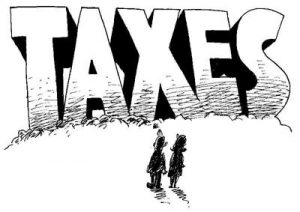EU Countries Seek to Tax Electronic Cigarettes the Same as Tobacco Ones
Ambassadors from all 28 member states of the European Union unanimously agreed to take the first step toward imposing a high excise tax on electronic cigarettes by asking the European Commission to draft an “appropriate legislative proposal” in 2017.
 Under current legislation, member countries must impose an excise tax of at least 57% on tobacco products, while electronic cigarettes are only subject to VAT, which averages at about 20% across the EU. And that’s apparently where the problem is. With electronic cigarettes growing in popularity all around the world and smokers switching to this less hazardous alternative – despite all the anti-vaping propaganda – many countries are seeing their national shrink and are looking for solutions to fill the gaps.
Under current legislation, member countries must impose an excise tax of at least 57% on tobacco products, while electronic cigarettes are only subject to VAT, which averages at about 20% across the EU. And that’s apparently where the problem is. With electronic cigarettes growing in popularity all around the world and smokers switching to this less hazardous alternative – despite all the anti-vaping propaganda – many countries are seeing their national shrink and are looking for solutions to fill the gaps.
This reality was confirmed by a European Commission report released late last year. It argued that “excluding e-cigarettes from the scope of excisable products might have significant long term budgetary implications for Member States. Some Member States have begun to levy a national tax on these products. This might in time jeopardize the proper functioning of the internal market if other Member States decide to do likewise in an uncoordinated way which would result in differentiated treatment across the EU.”
The Guardian reports that France and two other nations are calling for a minimum excise duty to be set at “the highest common denominator” while one EU official said that “there is an argument that it would be quite good to do something like minimum levels of excise duty for e-cigarettes. Member states could then decide whether to raise them higher or not” He added that “at present they don’t fall under excise duties like cigarettes, so maybe we would set a minimum threshold.”
In their request to the European Commission the 28 ambassadors that exempting e-cigarettes from excise duties could lead to “inconsistencies and legal uncertainty” and that implementing new legislation could also help meet “public health objectives”, although they have yet to explain how that last part makes any sense.
According to some official sources within the European Union, the price of e-cigarettes would certainly go up if the Commission went ahead with the ambassadors’ request, while others claim that it is not obliged to go ahead with the draft. However, they also mention that EU states would require “reasons” if the Commission decided not to act on this.
News of an excise tax on e-cigarettes has caused quite a stir within the European vaping community after news showed up in the media last week, but an official of the EU Commission has stated that there are “absolutely no plans at this stage to introduce excise duty for e-cigarettes. Nor has there been any suggestion that e-cigarettes would be taxed at the same level as cigarettes. Before taking any decisions, we would need to carry out an impact assessment, a public consultation and carry out a lot more technical work. It is far too early to predict the conclusions of this review, if any. The Commission will carefully listen to EU governments and fully consider their requests and views.”
Ecig Intelligence, a regulatory and marker news site for the e-cigarette sector, reports that the ambassadors’ initiative can be considered “a step toward a tax regime but not the introduction of one. It does look like such a regime will likely arrive, possibly as early as next year, but the decision still depends on the Commission’s findings.” It’s just one theory though, and only times will tell what the results will be for the e-cig industry and the vaping community.
Personally, I am trying to understand what the justification for an excise tax on e-cigarettes would be. The European Commission’s report was very clear in saying that smokers turning to e-cigs are affecting national budgets, but you really can’t use that as a reason, can you? ‘Sin taxes’ for actual tobacco products and alcohol can be explained by the way their adverse effects impact the economy, but that does not apply to electronic cigarettes.
In fact, there is ample scientific evidence that electronic cigarettes have a positive impact on public health and could save millions of lives. So why ask for them to be taxed as tobacco cigarettes? To make it less enticing for smokers to switch to vaping, to financially punish them for it?
















